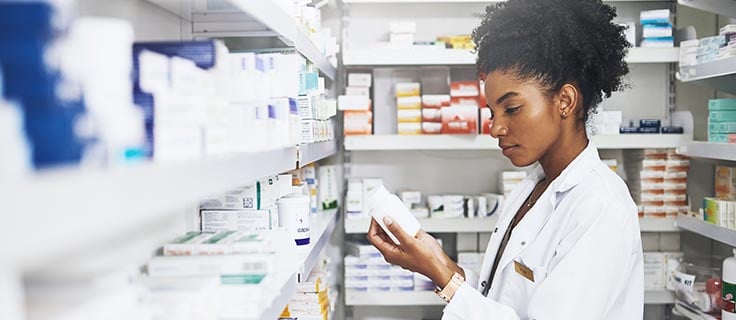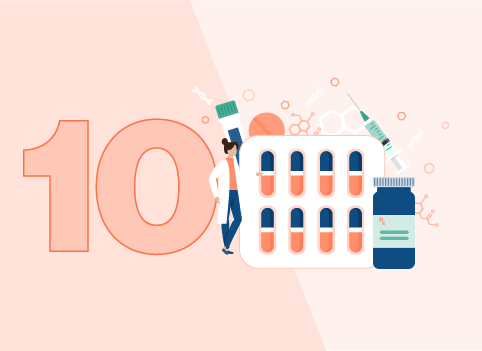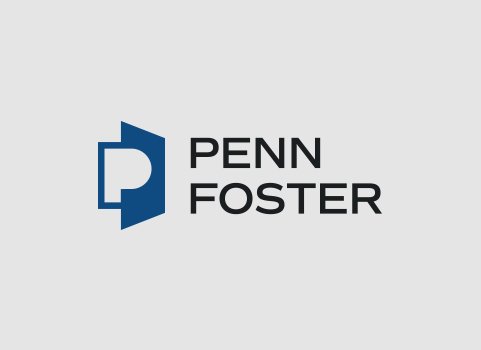What classes do I need to take to learn how to become a pharmacy technician?
Over the course of the pharmacy technician program, you will take classes covering a range of topics that have been carefully designed based on ASHP standards and align with the PTCE and ExCPT certification exams. Some such courses include Pharmacology, Pharmacy Practice Law and Regulations, Math Calculations for Pharmacy Technology, Pharmacy Management Software, and much more. You can find a full list of the courses you will take on our pharmacy technician program details page.
How long does it take to complete a pharmacy technician diploma?
At Penn Foster, there is no set time frame for acquiring a pharmacy technician career diploma. Because our program is self-paced, students are able to complete the program at a variety of paces depending on how much time they are able to put into their courses each week.
What are the prerequisites needed to enter a pharmacy technician program?
In order to enroll in pharmacy technician school, you’ll need a high school diploma or a GED and will need to be at least 17 years of age. You also will need access to a computer with an internet connection, as our program is completely online.
What skills will I learn in a pharmacy technician program?
In our accredited Pharmacy Technician Program, you will learn the skills used by a practicing pharmacy technician including pharmacology, sterile and non-sterile compounding, pharmacy management, and operations. In addition to your course-based learning, the program includes interactive and engaging exercises with hands-on practical labs and real-world simulations such as processing a cash transaction, counting medication with prescription interpretation, and preparing medication for dispensing.
Is the pharmacy technician externship required?
Yes, the pharmacy technician externship is required for the ASHP/ACPE-accredited Pharmacy Technician Professional Program, and it can be a great opportunity to demonstrate what you’ve learned in a real pharmacy setting! Through your externship, you'll be able to make connections and get hands-on training from experienced pharmacists and pharmacy technicians at national retail pharmacies such as CVS, Kroger, or Walgreens. The externship will consist of 130 hours of clinical training where you'll complete the actual tasks you're expected to do as a working pharmacy technician. If you need to complete an ASHP/ACPE accredited program to meet state requirements, the externship is an essential component of your learning experience and provides a great opportunity to hone and demonstrate valuable pharmacy technician skills.
Not interested in ASHP/ACPE accreditation and would prefer to do your pharmacy technician training without an externship? Take a look at our Pharmacy Technician Program.
Are textbooks included in the pharmacy technician program?
As part of the pharmacy technician curriculum, students have access to digital textbooks and the interactive learning experience includes hands-on learning and virtual exercises around processing a cash transaction, counting medication with prescription interpretation, and preparing medication for automated dispensing. Students also receive a full practice kit of items necessary to complete their practical labs, all included in your tuition.
Is Penn Foster's Pharmacy Technician Professional Program nationally accredited?
The Pharmacy Technician Professional Career Diploma Program is ASHP/ACPE accredited and is modeled against ASHP standards to ensure students are qualified to work in a range of environments. This accreditation is the national standard for pharmacy technician training programs and is required in some states and preferred by many employers.
Will I receive a professional certification at the end of the program?
Upon completion of the Pharmacy Technician Professional Program, you will receive a diploma from Penn Foster and the program will have helped you prepare to sit for either of two industry certification exams: the PTCE certification exam or the ExCPT certification (offered through NHA). A voucher to cover the cost of the PTCE certification exam is included in your tuition. You will need to pass the PTCE or the ExCPT certification exam in order to be formally certified.
Do I need an accredited pharmacy technician program?
Requirements vary from state to state, but many states do require you to obtain industry certification, such as the PTCE or ExCPT, and/or some states and employers require pharmacy technicians to have successfully completed an ASHP-accredited training program.
Where can I work as a pharmacy technician?
The most common place to work as a pharmacy technician is a retail pharmacy such as CVS, Kroger, or Walgreens, but there are several other environments available to those entering the field. Hospitals, doctors’ offices, and nursing homes all host their own pharmacies and need a reliable workforce of pharmacy technicians.
What is the salary for a pharmacy technician?
Your salary as a pharmacy technician will depend on your level of experience and your location, as the average salary changes based on your state of residence but the national average salary in 2023 was $40,300.* Be sure to check salary information for your state to get a better idea of what you can expect to make with a pharmacy technician diploma.
Is pharmacy technician a good career?
With increasing demand and projected growth in job opportunities, becoming a pharmacy technician can be a stable career path. Pharmacy technician careers are projected to grow by 7% from 2023 to 2033, making it an ideal time to enter the field.*
Do you need a degree to become a pharmacy technician?
In order to become a pharmacy technician, you’ll need a high school diploma or GED. Though some workplaces offer on-the-job training, some employers may prefer pharmacy technicians to have formal training before hiring them. Earning a degree and certification prior to employment may help you stand out when applying for jobs in the field.
How do you become a pharmacy technician?
You can become a pharmacy technician in a few different ways. By going to an accredited pharmacy technician school like Penn Foster, you can earn a diploma and prepare to sit for the PTCB or ExCPT certification exams. Some employers accept pharmacy technician applicants without a diploma and offer on-the-job training but these opportunities are less common.















